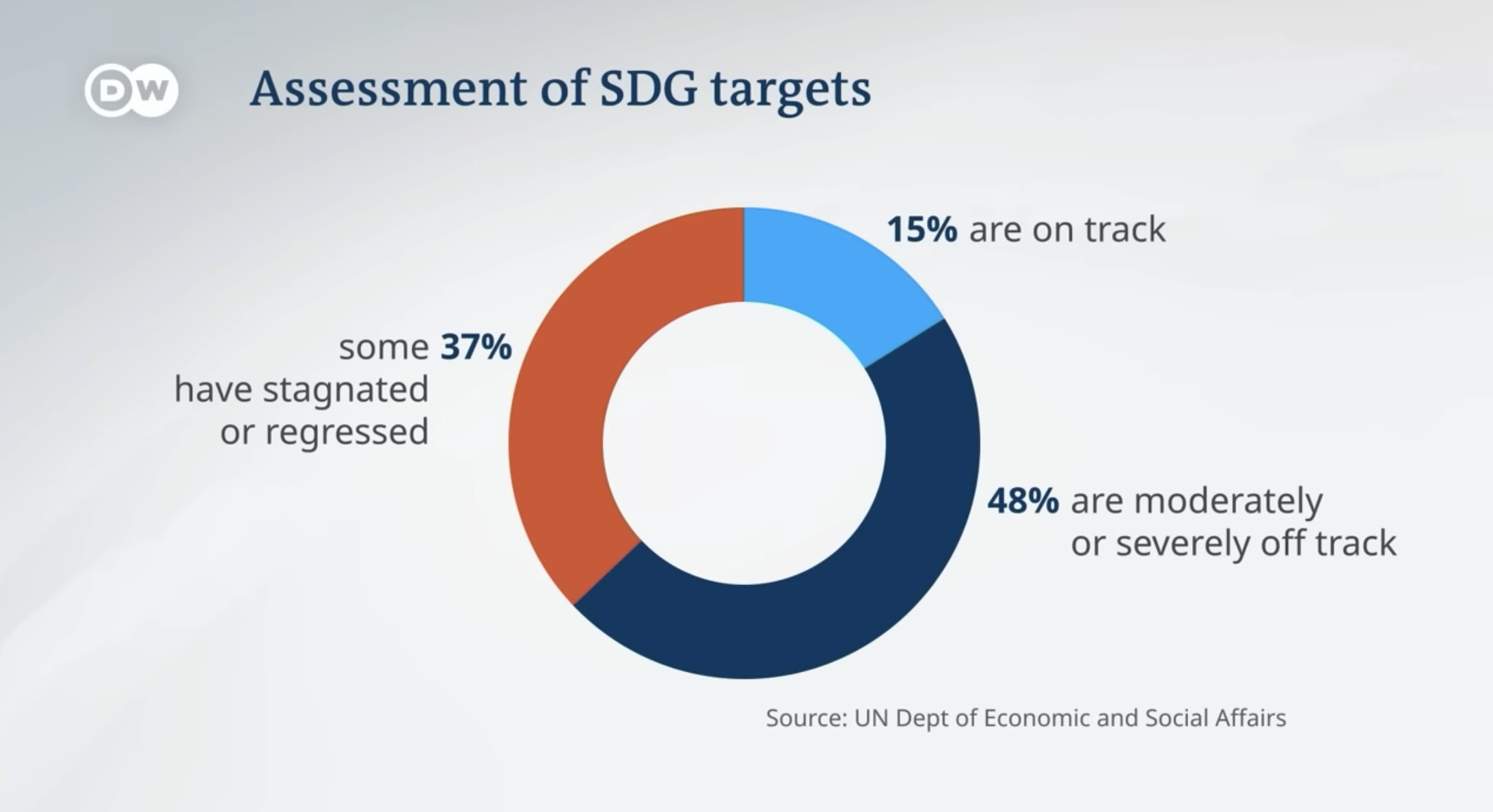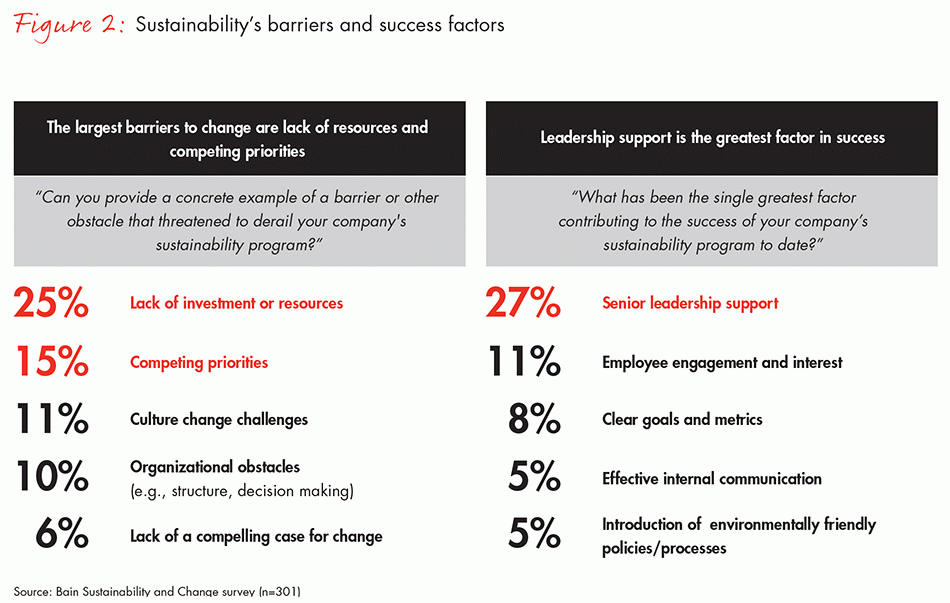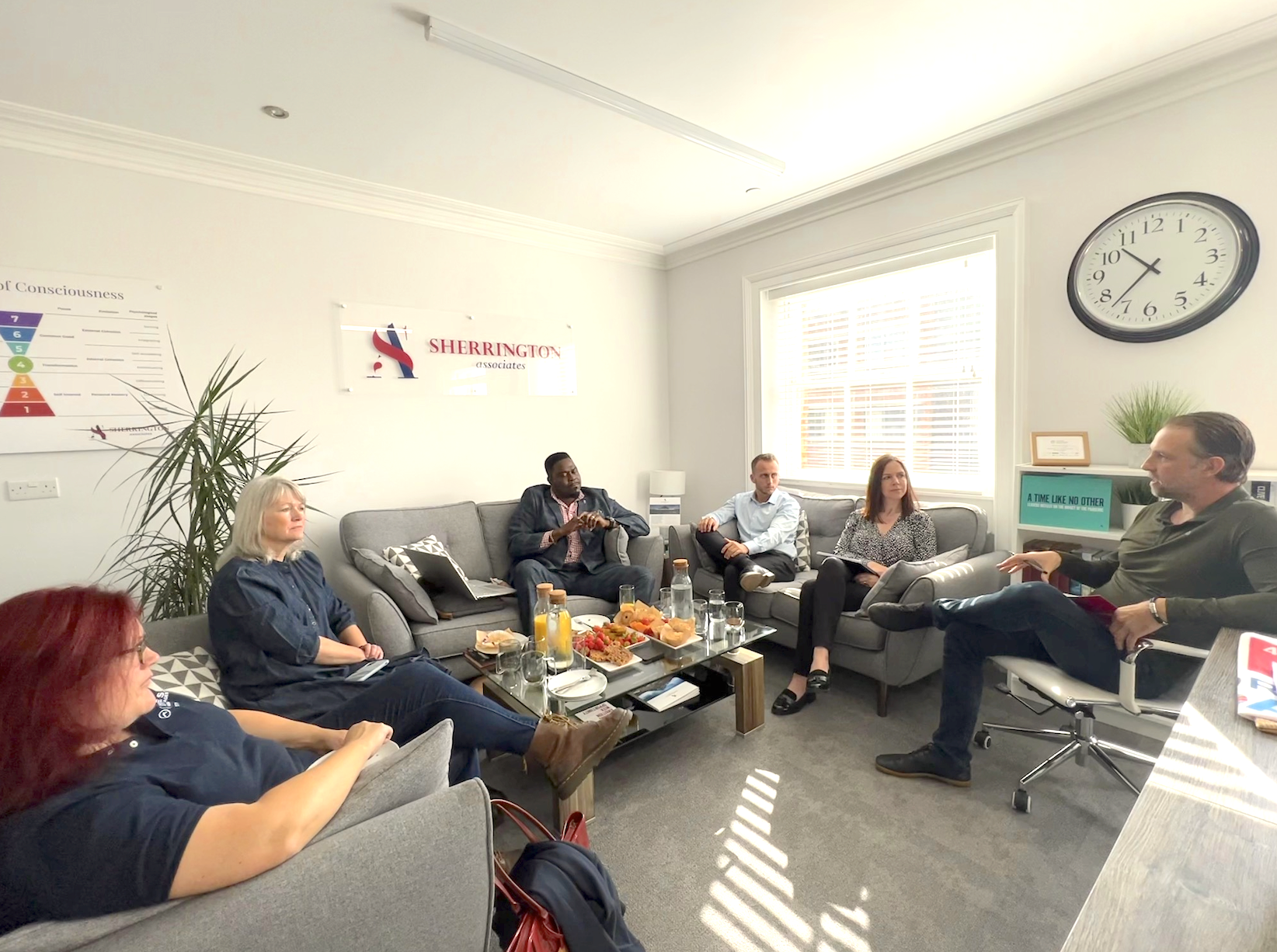Sherrington hosts sustainability leaders on anniversary of SDGs to debate:
“Are the SDGs still alive?”
25th September 2023
In attendance:
Donna Okell – Co-CEO, UK for Good
Claire Binns – Senior Impact Manager, Sykes Holiday Cottages
Garth Dallas – Co-Founder, Good Small Business Awards
Joanne McKay – Operations Director, Sherrington Associates
Joe Onions – Head of Future Sustainable Leaders Programme, Sherrington Associates
Rob McKay – Managing Director, Sherrington Associates
On Monday, 25th September, Sherrington Associates were privileged to host a small group of some of the most passionate sustainability champions in the North West region to discuss whether, on this important anniversary, the United Nations Sustainability Goals are still alive and whether in fact our chances of achieving the goals by 2030 are still even realistic, given the dismal performance to date.
Chairing the session, Managing Director of Sherrington Associates Rob McKay began by sharing a slide from a recent report by the US Department of Economic and Social Affairs, that highlighted some pretty worrying statistics about our the current state of play.

The statistics were the backdrop to the first question of the day…
“Why are we failing?”
Donna Okell opened the discussion by introducing the findings from a 2016 report from global management consultancy Bain & Company who, after surveying 300 major companies across the globe about their performance against targets for corporate sustainability programmes, found that only 2% succeed.
This was particularly interesting, as Sherrington Associates studied the very same report years earlier when developing our groundbreaking 4A Model of Sustainable Leadership. What the report illustrates is that the major reason for this abysmal performance, is a failure to gain leadership support.

Donna went on to highlight a lack of leadership accountability, also citing a failure in marketing the SDGs given that of the 5.8m businesses in the UK alone, so few of them seem to be actually attempting to implement SDGs into business management.
But despite the bleak outlook, there are an increasing number of companies using the SDGs to focus their sustainability efforts towards clear and specific areas of interest. Claire Binns, Senior Impact Manager at Sykes Holiday Cottages, a business of over 1,000 staff and 35 regional offices across the UK and internationally, explained how Sykes have elected to identify five SDGs that their work most related to and can impact most (SDG1 No Poverty, SDG3 Good Health & Wellbeing, SDG5 Gender Equality, SDG10 Reduced Inequalities, SDG13 Climate Action).
Not every employee at Sykes may be fully aware of all seventeen Sustainable Development Goals, but through our transformation to a ‘profit-for-purpose’ organisation and through our recent B Corp certification, staff are all now tuned in to the higher-level reasons they come to work every day and this is a hugely positive step forward.
Claire Binns - Senior Impact Manager, Sykes Holiday Cottages
For many businesses the concept of the SDGs is overwhelming, not least due to the number of them. Garth Dallas, a Liverpool-based employment lawyer and founder of The Good Small Business Awards, introduced the question of just how realistic are the Sustainable Development Goals and can small businesses actually integrate them as easily as large businesses. Whilst the SDGs were established in Paris back in 2016 as a framework to tackle global challenges at a country level, for this to work, organisations of all shapes and sizes need to first learn about and engage with the goals and then, to Garth’s point, be able to act on them.
Garth went on to illustrate some of the work in Liverpool, a city that has done more than most large cities in the UK to act on the SDGs’, establishing a net-zero plan for 2030 and leading the North West to become a thriving, fair and sustainable city with a burgeoning green economy. Garth explained that by signing up to local reporting on SDGs, Liverpool raised awareness of the goals for businesses across the city and that while many businesses may be struggling with the current economic challenges, there is no lack of desire to do more.
The group then moved on to the second question of the day…
“When it comes to SDG failure, who are the greatest offenders?”
The failure of our collective responsibility to deliver on the SDG’s, largely lands on the shoulders of leadership, however no one individual or group of individuals is on their own entirely to blame. Our world is in crisis and we all have a role to play, however small.
Evidently some parties are more guilty than others, look at billionaires – they shouldn’t even exist! There’s more than enough resources to go around, but not when the ultra-wealthy collude with corporate actors to promote a culture of greed and never-ending growth and consumption. Look at L’Oreal, they say we’re worth it. Retail therapy in the context of the current crises is really not worth it. Focusing only on blame and guilt isn’t helpful though. We need to understand the origins of the these issues yes, but then need to focus on opportunity and responsibility.
Donna Okell - Co-CEO, UK for Good
Focusing only on blame and guilt isn’t helpful, observed Donna. Opportunity and responsibility are themes which bring hope into the conversation, a point the group agreed on unanimously.
Donna’s example of retail marketing opened up a wider conversation of the marketing industry’s role in doubling down on promoting consumerism in spite of the goal’s inception in 2015. It would appear that the machine that is corporate marketing has not only told us we need to consume more and more regularly, but that we need their products now, today and the click of a button. The notion of GDP growth as a measure of success was suggested as deeply flawed by the group, and in the context of a world with finite resources, a rewiring of economic systems seemed the only logical solution.
“What can we do to accelerate action on the SDGs?”
It wasn’t surprising that the group shared a collective belief that any attempt to increase the pace and scale of SDG action wasn’t going to be easy.
Let me clear. All the goals are noble, but are they realistic? Goal one is to end all forms of poverty, but this will not happen in my lifetime. It’s complex, but what we can do is, attempt to shift away from this legacy of Thatcherite economics that says ‘there is no alternative’… there is an alternative. If we can adopt the philosophy that there is another way and that social solidarity is the foundation, then we have a chance.
Garth Dallas - Co-Founder, Good Small Business Awards
Empathising with this dose of reality from Garth, and with the challenges behind making well-intentioned but complex decisions that are not without consequences, Joanne shared the story of a sustainability leader she’d spoken with recently from a major retailer who had travelled to South America to shut down a broccoli farm that had failed to uphold the required standards for modern slavery. Only on arriving, did they realise the extent of which the workforce of mainly teenage mothers, most of whom relied on this employment as their only source of income in an otherwise baron, rural employment market. Closing the farm would have meant dire consequences for the lives of these women and their families. So, making decisions to accelerate action on the goals at any level, be it micro or macro, requires high levels of systems thinking to develop solutions that don’t create as many problems as they solve.
Following these important points around realism and complexity from Garth and Joanne, Donna raised the importance of courage and unity.
There are hundreds if not thousands of these lovely, little echo chambers up and down the country, all over the planet, but our voices are dispersed and are not being heard. Certain pressure groups are gaining more exposure than others. We need to learn from those who are having the most impact, unify with other like-minded businesses by attaching your own business to the most effective groups and have the courage to speak up and say ‘this isn’t working, we need a better way’.
Donna Okell - Co-Founder, UK for Good
The impact of major world events can either help or hinder collective efforts towards a more sustainable world, depending on perspective. Claire raised the point that whilst during the event itself, the world felt for one moment that perhaps a new shared commitment towards sustainability had finally been realised, but in reality, three years after, it seems that hasn't quite been the case. In a lot of cases she explained, apathy has grown, hopelessness has set in and an attitude of 'but what can I do alone?' has become the barrier to collective action. If large corporate actors set a negative example then this justifies those attitudes, whereas if businesses such as Sykes, Sherrington and other purpose-led and positively impactful businesses such as those in the B-Corp community can lead by example, then this inspires hope and optimism and helps address apathy.
Government policy has a huge impact on individual's sense of belief. If the keep kicking the can down the road on environmental targets, this doesn't help inspire action at the individual level at all.
Claire Binns - Senior Impact Manager, Sykes Holiday Cottages
Elaborating on the subject of Covid and it's impact on sentiment towards sustainability, Garth highlighted another viewpoint that Covid had in some cases actually shown how interdependent we are as a species and that whilst other world events have introduced new challenges in the years since the global lockdowns, many have repurposed their lives of the better, having been inspired by the collective action we saw by society during 2020 and 2021. Equally the businesses who bounced back the strongest in the wake of the pandemic are those who looked after their employees at the time.
So, a fascinating debate on the anniversary of arguably the most important global consensus in history. Themes of interdependence, the need for unity, the need for bold new thinking and rewiring systems at pace. The time for talking is over. The time for action is now. Thank you to all who participated and for sharing your insights.
#TogetherfortheSDGs






